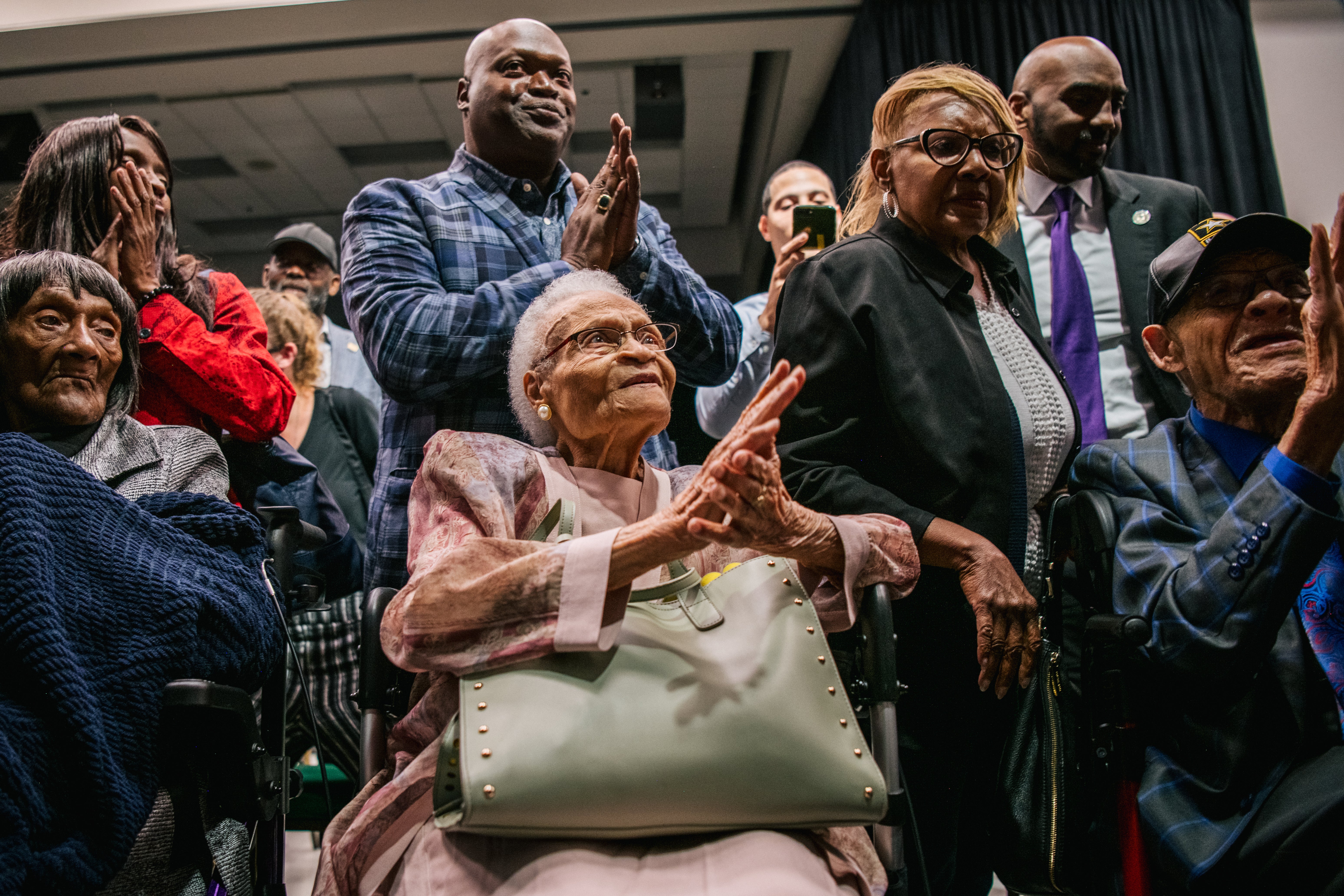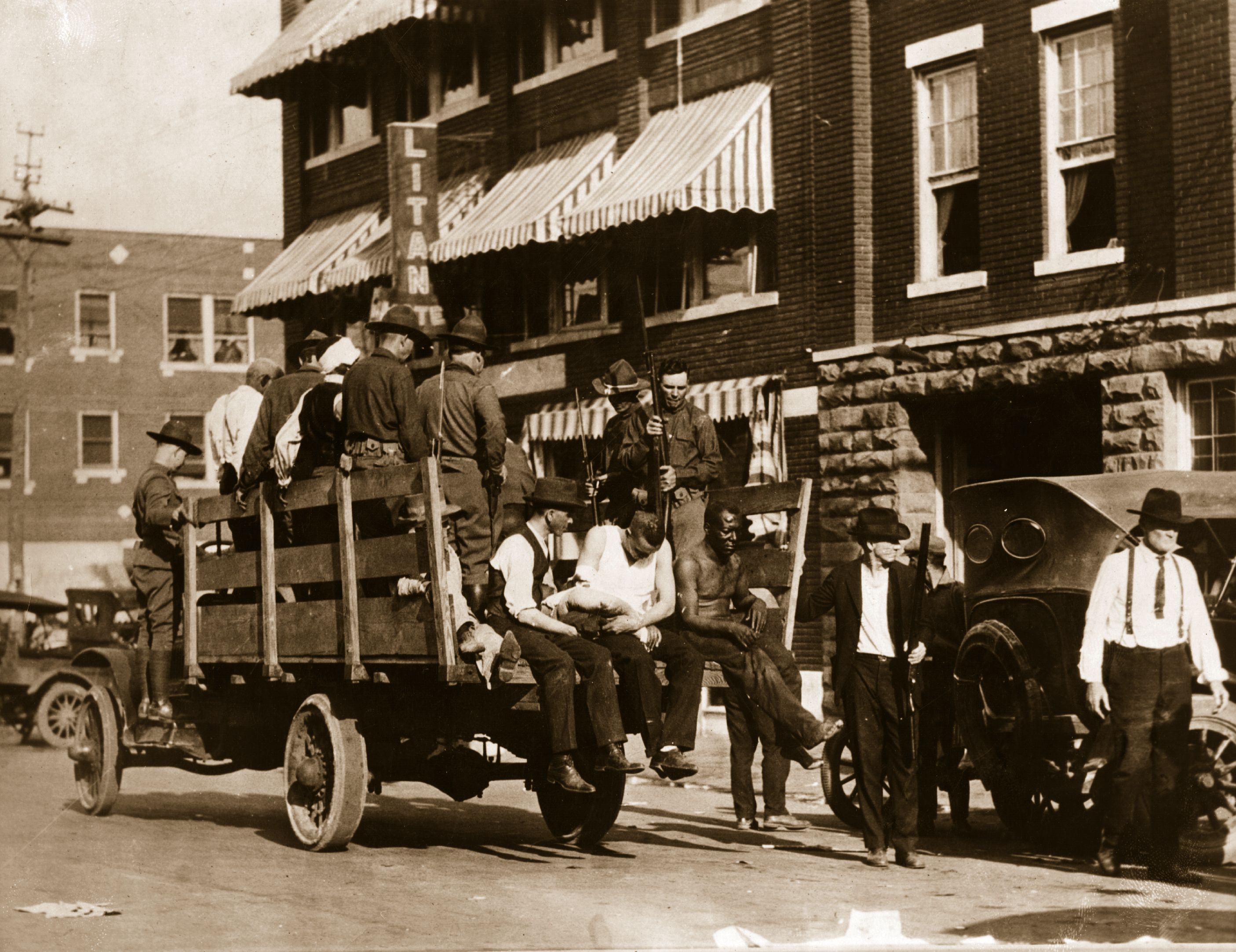Oklahoma court tosses Tulsa race massacre lawsuit that would have forced city to offer reparations to victims
Survivors of the 1921 attack sought justice with a decades-in-the-making legal battle
Oklahoma’s highest court has rejected a decades-in-the-making lawsuit from a racist massacre’s two remaining survivors demanding justice in its ongoing aftermath.
More than 100 years after a white mob destroyed a bustling Black neighborhood, killed dozens of people and left hundreds of others homeless, the Oklahoma Supreme Court on Wednesday upheld a lower court’s decision to dismiss the challenge.
The lawsuit from Lessie Benningfield Randle, 109, and Viola Ford Fletcher, 110 – who were small children during the Tulsa Race Massacre – continued on even after the death of Fletcher’s brother, Hughes Van Ellis, who was also a plaintiff before dying at age 102 last year.
On May 31, 1921, in Tulsa’s thriving “Black Wall Street” of Greenwood, an armed white mob deputized by law enforcement fired indiscriminately on Black Americans in the street.
According to witness accounts and limited news coverage of the attack, planes dropped flaming turpentine-soaked rags and dynamite, and the bodies of Black victims were thrown into the Arkansas River or into mass graves. Survivors were rounded up at gunpoint and detained in internment camps.
The mob torched and looted homes and businesses, including restaurants, hotels, theaters and a newspaper’s office. A truck mounted with a machine gun fired on Mount Zion Baptist Church before it was burned to the ground.
No one was ever charged with a crime.

A lawsuit, targeting Oklahoma’s public nuisance law, argued the massacre’s impact continues to be felt decades later in the city’s enduring racial disparities, economic inequalities and in the trauma among survivors and their descendants.
The lawsuit sought a detailed accounting of the property and wealth lost or stolen in the massacre, the construction of a hospital in north Tulsa, and the creation of a victims’ compensation fund, among other demands.
The lawsuit named Tulsa County Sheriff’s Office, Tulsa’s Chamber of Commerce, county commissioners and the Oklahoma Military Department as defendants.
In the state supreme court’s decision, justices noted that the plaintiffs’ “grievances are legitimate” but “they do not fall within the scope of our state’s public nuisance statute.”
“And even accepting as true plaintiffs’ claim that the lingering economic and social consequences of the massacre still, to some extent, endanger the comfort and repose of the Greenwood and North Tulsa communities, those lingering consequences over [100] years later, standing alone, do not constitute a public nuisance, as that term has been construed by this court,” the justices wrote.
“The continuing blight alleged within the Greenwood community born out of the massacre implicates generational-societal inequities that can only be resolved by policymakers – not the courts,” they added.

In 2021, recognizing the 100th anniversary of the attack, Tulsa Mayor GT Bynum issued an apology on behalf of the city, while millions of dollars were raised to commemorate the massacre and open a community center.
The plaintiffs had also accused city officials of misappropriating their images to promote the massacre’s centennial.
“They haven’t honored anything,” civil rights attorney Damario Solomon-Simmons told The Independent last year. “They commercially capitalized off the massacre to create a tourism district, raised 30-plus million dollars that benefits the white power elite here in Tulsa. That’s what this has been all about.”
Plaintiffs vowed to appeal up to the state supreme court after a judge dismissed the complaint last year.
“We will not go quietly,” survivors said in a statement read by Solomon-Simmons at the time. “We will continue to fight until our last breath. Like so many Black Americans, we carry the weight of intergenerational racial trauma, day in and day out.”
The state supreme court heard arguments in their appeal on April 2.
In a joint statement before that hearing, Randle and Fletcher said: “We are grateful that their now-weary bodies have held on long enough to witness an America, and an Oklahoma, that provides race massacre survivors with the opportunity to access the legal system.”
Lawyers for the plaintiffs said in a statement to The Independent on Wednesday that they should be entitled to a trial.
“Yet the Court held that Mother Randle and Mother Fletcher have asked the Court to decide a ‘political’ question that is beyond the purview of the Court,” they said. “Incredibly, during the extensive oral argument the Supreme Court held on the appeal, not a single member of the nine-member Court asked a question about this political question theory. It is not a political question simply because the suit seeks to remedy wrongful acts perpetrated by a white mob against Black people – the court system is the very place where such harms are meant to be remedied.”
Lawyers said they are calling on the US Department of Justice to investigate the massacre, which “remains a vivid memory” for the plaintiffs, who are celebrating their 110th birthdays this year. “Time is of the essence for this investigation to begin,” they wrote.
Join our commenting forum
Join thought-provoking conversations, follow other Independent readers and see their replies
Comments
Bookmark popover
Removed from bookmarks